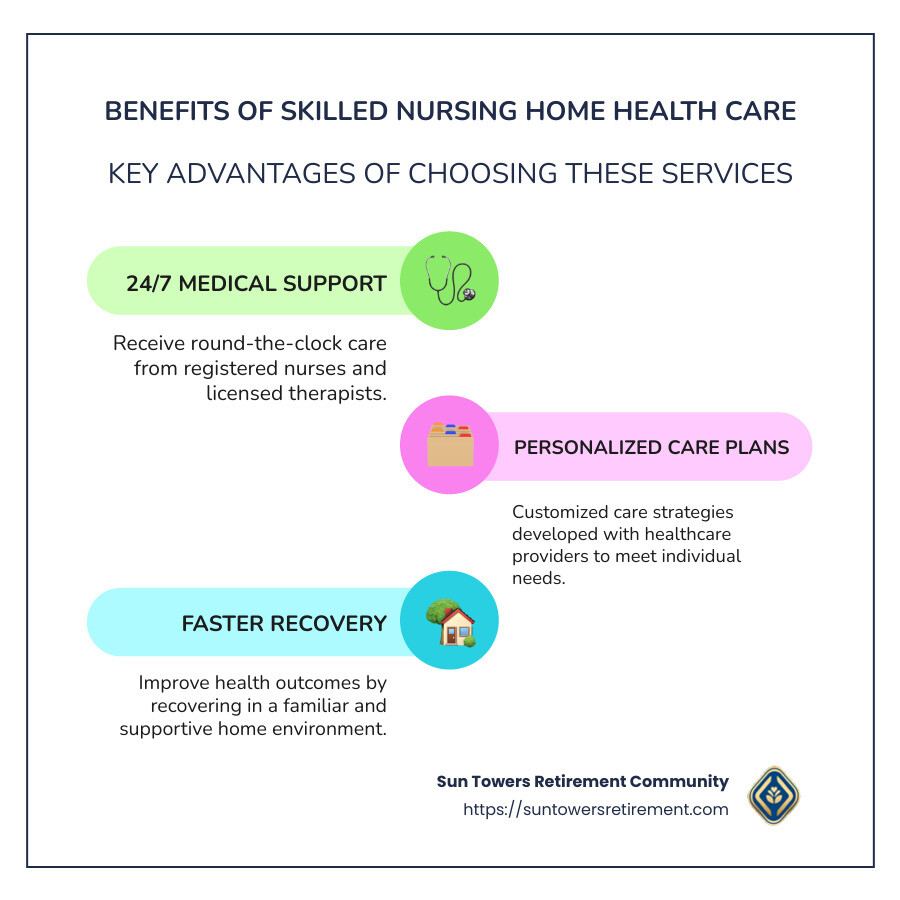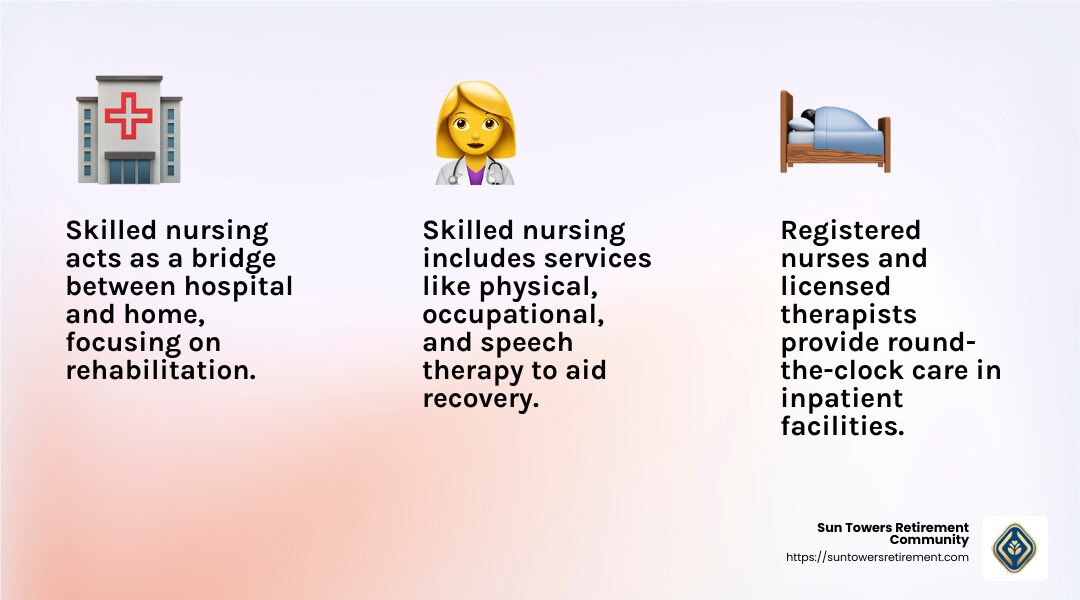Skilled Nursing Home Health Care: Top 5 Vital Facts 2024
Skilled nursing home health care is an essential component for those needing medical attention at home or in a specialized facility. Whether you’re recovering from surgery or managing a chronic condition, skilled nursing home health care is ready to provide:
- 24/7 medical support by registered nurses and licensed therapists
- Personalized care plans created with healthcare providers
- Faster recovery and improved health outcomes by staying in a familiar environment
Navigating the field of skilled nursing and home health services can be daunting, especially when ensuring that our loved ones receive the quality care they deserve while maintaining their independence. Understanding these options helps alleviate the fear of losing autonomy, allowing individuals to continue their active lifestyle within a supportive community.
Understanding Skilled Nursing Home Health Care
What is Skilled Nursing?
Skilled nursing is a specialized form of medical care that provides intensive support to individuals who need help recovering from surgery, managing chronic illnesses, or dealing with other health challenges. It typically takes place in an inpatient facility where trained professionals, like registered nurses and licensed therapists, offer round-the-clock care.
Think of skilled nursing as a bridge between the hospital and home. It focuses on rehabilitation and includes services like physical therapy, occupational therapy, and speech therapy. This type of care is essential for those who need more than what a regular caregiver can provide but do not require the full services of a hospital.
Differences Between Skilled Nursing and Home Health Care
Understanding the distinction between skilled nursing and home health care is crucial for making informed decisions. Both offer medical support, but they differ in their approach and setting.
Skilled Nursing:
- Inpatient Facility: Care is provided in a dedicated facility.
- Medical Need: Ideal for those requiring continuous monitoring and assistance with daily activities.
- Rehabilitation Focus: Offers comprehensive rehabilitation services, ensuring patients regain their highest level of functioning.
Home Health Care:
- Home Environment: Care is delivered at the patient’s home, promoting comfort and familiarity.
- Skilled vs. Non-Skilled: Combines skilled medical care with non-skilled support like meal preparation and companionship.
- Flexibility: Adaptable to the patient’s schedule and needs, allowing for a more personalized approach.
Both options aim to improve health outcomes, but the choice between them depends on the individual’s specific medical needs and personal preferences. Understanding these differences can help families choose the right path for their loved ones, ensuring they receive the best possible care custom to their situation.
Benefits of Skilled Nursing Home Health Care
When it comes to skilled nursing home health care, the advantages are clear. This approach combines the rigorous medical support of skilled nursing with the comfort and familiarity of a home environment. The benefits are numerous but can be summed up in two main areas: faster recovery and personalized attention.
Faster Recovery at Home
Recovering at home often results in quicker healing. Why? Being in a familiar environment, surrounded by loved ones, can significantly boost a patient’s morale and motivation to get better. Studies show that patients tend to recuperate faster at home compared to a hospital setting. The presence of family members provides emotional support, which is a crucial component of the healing process.
Moreover, the home setting allows for a more relaxed and stress-free recovery. Patients can follow their own schedules, enjoy their own meals, and sleep in their own beds—all of which contribute to a more effective healing process.
Personalized Attention and Care
One of the standout benefits of skilled nursing home health care is the personalized attention patients receive. Unlike in a hospital or nursing home, where care is often generalized, home health care offers one-on-one focus. This means that care plans are custom to meet the specific needs of the individual.
For instance, a patient recovering from surgery might need more physical therapy, while someone managing a chronic condition like COPD might require specialized breathing exercises. In-home care allows for this level of custom support, ensuring that each patient receives the exact care they need.
This personalized approach not only improves health outcomes but also improves the patient’s overall quality of life. With skilled professionals available around the clock, patients can rest assured they are in capable hands, receiving the best possible care in the comfort of their own homes.
Conditions Supported by Skilled Nursing Home Health Care
Chronic Condition Management
Skilled nursing home health care is a lifeline for those managing chronic conditions. It provides a comprehensive approach to care that addresses ongoing medical needs in the comfort of one’s home. Conditions like Chronic Obstructive Pulmonary Disease (COPD), End-Stage Renal Disease (ESRD), and multiple sclerosis require specialized attention and continuous management.
-
COPD: Patients benefit from respiratory therapies and exercises custom to improve lung function and breathing efficiency. Skilled nursing care provides these essential services, helping patients manage symptoms and improve their quality of life.
-
ESRD: For those with kidney disease, home health care includes monitoring vital signs, managing medication, and coordinating dialysis treatments. This ensures patients receive the necessary support without the constant need for hospital visits.
-
Multiple Sclerosis: The fluctuating nature of this condition demands adaptive care strategies. Skilled nurses offer personalized support, including physical therapy and medication management, to help manage flare-ups and maintain mobility.
Post-Hospitalization Recovery
Recovering from surgery or an injury can be challenging, but skilled nursing home health care makes the process smoother and more effective. It bridges the gap between hospital discharge and full recovery, providing essential medical support right at home.
-
Surgery Recovery: Post-surgical care often involves wound management, pain control, and physical therapy. Skilled nurses work closely with patients to ensure a safe and speedy recovery, reducing the risk of complications and readmission.
-
Injury Management: Whether it’s a broken bone or a severe sprain, injuries need careful attention to heal properly. Home health care professionals develop rehabilitation plans that focus on restoring mobility and strength, custom to each patient’s specific needs.
In both chronic condition management and post-hospitalization recovery, skilled nursing home health care offers a personalized, patient-centered approach. This ensures that individuals receive the right care at the right time, leading to better health outcomes and an improved quality of life.
Frequently Asked Questions about Skilled Nursing Home Health Care
What qualifies a patient for skilled nursing care?
Skilled nursing care is essential for individuals who require medical attention beyond basic care. Patients typically qualify if they need rehabilitation after a hospital stay, have complex medical conditions, or require ongoing management for chronic diseases like COPD or ESRD. A physician’s recommendation is usually necessary to determine the need for skilled nursing services. This ensures that patients receive the appropriate level of care custom to their specific health needs.
How does skilled nursing differ from assisted living?
The primary distinction between skilled nursing and assisted living lies in the level of medical care provided. Skilled nursing facilities offer comprehensive medical and rehabilitation services, including long-term care for individuals with significant health needs. In contrast, assisted living focuses on supporting daily activities with limited medical oversight.
Skilled nursing is suited for those needing intensive medical support, while assisted living is ideal for individuals who maintain some independence but need help with daily tasks. This difference means that skilled nursing facilities are equipped to handle more complex health issues, offering therapies and medical supervision that assisted living communities do not provide.
What services are included in skilled nursing care?
Skilled nursing care encompasses a wide range of services designed to support recovery and manage health conditions. Key services include:
-
Physical Therapy: Aimed at improving mobility, strength, and overall physical function. It’s essential for patients recovering from surgery or injury.
-
Occupational Therapy: Focuses on helping patients regain the ability to perform daily activities, like dressing or cooking, enhancing their independence.
-
Speech Therapy: Assists individuals with speech or swallowing difficulties, often crucial for stroke recovery or neurological conditions.
In addition to these therapies, skilled nursing care includes medical monitoring, medication management, and wound care. This comprehensive approach ensures that patients receive holistic care, custom to their unique health requirements, promoting faster recovery and improved quality of life.
By understanding these aspects of skilled nursing home health care, families can make informed decisions about the best care options for their loved ones, ensuring they receive the support they need.
Conclusion
At Sun Towers Retirement Community, we are dedicated to providing a continuum of care that supports residents at every stage of their journey. Our skilled nursing services are part of this comprehensive approach, ensuring that as your health needs evolve, your care evolves too. This makes it possible for residents to enjoy the comfort and familiarity of their community while receiving the medical attention they need.
Aging in place is a key benefit of choosing Sun Towers. Our community offers various living options—from Independent Living to Assisted Living, Memory Care, and Skilled Nursing—all under one roof. This means you or your loved ones can transition seamlessly between different levels of care without needing to move to a new facility. It’s about maintaining independence and quality of life, with the peace of mind that expert care is always available.
Our skilled nursing home health care provides personalized attention and support for a wide range of conditions, from post-hospitalization recovery to chronic condition management. With our team of dedicated professionals, residents receive the highest quality of care custom to their individual needs.
At Sun Towers, we believe that everyone deserves to age with dignity and grace. Our commitment to a continuum of care and aging in place ensures that our residents can live fully, with the support they need, right in their own community.
For more information about our skilled nursing facilities and how we can support you or your loved ones, visit our Skilled Nursing Facilities page. Let us help you steer the journey of aging with confidence and care.




















